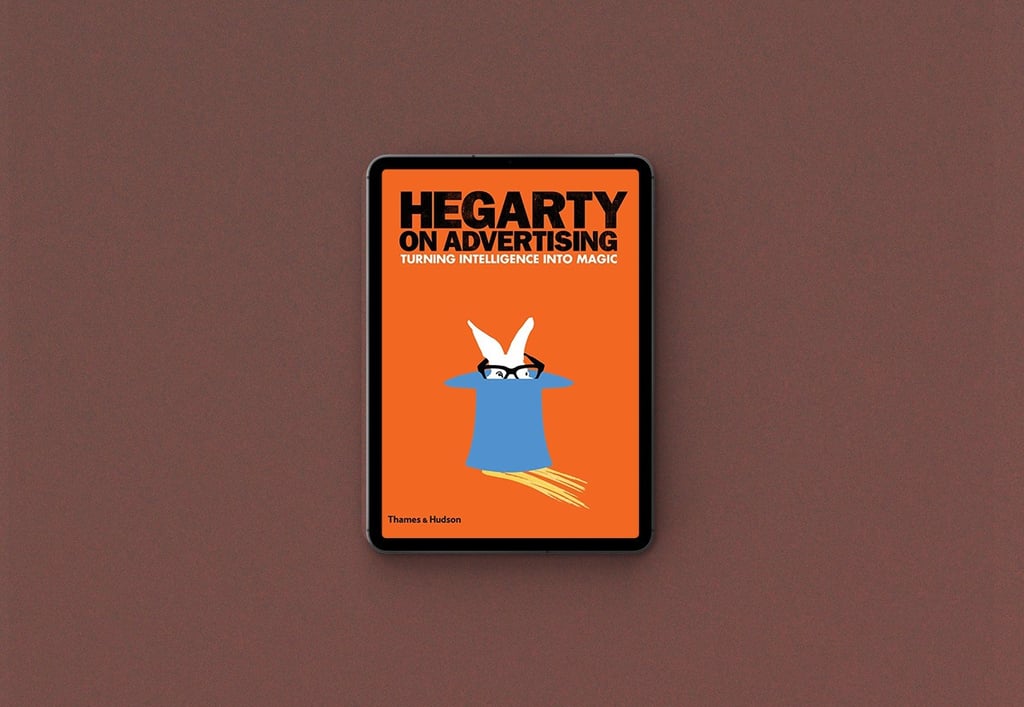Inspiring Ideas From ”Hegarty on Advertising: Turning Intelligence into Magic”
BOOK HIGHLIGHTS
7 min read


Introduction 👀
Advertising must be an integral part of a brand—woven into the very fabric of a product—and it should make that product or brand resonate with the public. We can't underestimate the power of advertising that is honest, truthful, disarming, and witty.
“Bernbach showed us that the truth is the most powerful strategy you can employ in advertising. It was his belief that this style of creativity could be inclusive and inspiring as well as intelligent - it didn’t have to be patronising to succeed and it demonstrated that humour was an incredibly powerful tool.”
Reduction - it's a fundamental skill in advertising - reducing and cutting out words, making copy succinct, punchy and to the point.
Hegarty defines creativity as an ‘expression of self’. We can’t create outstanding work if we don’t put a little bit of ourselves into it—our heart, soul, or beliefs. Whether it's painting, writing, designing, or advertising, it should be an expression of who we are.
Without this, we’re merely going through the motions, and the work will likely lack impact and longevity. “That’s why some creative people are insufferable - they’re not just doing a job, they are expressing their beliefs.”
Looking to the past, Hegarty learned the importance of having a belief—a philosophy driving his ideas.
It was never just about creating work, but about being an individual with a story to tell and a passion for expressing ideas. He believes we all have the chance to change the world and inspire wide audiences.
Hegarty also highlighted the power of juxtaposition—placing one culture against another to spark entirely new and innovative ideas. But at our core, we all have personal stories that shape us. Drawing on past emotions and experiences can help us become truly great creatives.
Ideas 📢
According to Hegarty, ideas can change the future of brands, of countries and of the course of history - they engage, stimulate, entertain, and encourage debate, dissent and adoration. Most importantly, ideas can be done by anyone and at any time.
The trick of advertising is to make the presented information look interesting and relevant - ultimately, it’s just common sense and a desire to excite people. How can we do it? Simply relax and let our true selves perform.
On creativity…
Creativity isn’t about predictability, it must offer surprise and challenge, be daring and yet motivating. Creativity is like magic - “a manic construction of absurd, unlikely irreverent thoughts and feelings that somehow, when put together, change the way we see things.”
Creativity is NOT a process, but advertising is. The process is trying to make order out of chaos, but creativity is about trying to make chaos to create order. They are opposite ends of a spectrum.
When irreverence touches design it creates opportunities for producing genuinely innovative and lasting work. How? By combining and executing seemingly impossible tasks. By throwing out the rule book - being irreverent - and turning the engine sideways. Of course, using irreverence for its own sake can be dangerous.
“The function of irreverence should be to help question and, in doing so, offer a possible solution.”
Humour and irreverence are also a good combination that just works - they feed of each other and create opportunities to enhance each other’s message. When put together, they can become more persuasive than on their own.
Creative people have a task to constantly strive to get others to reconsider, to re-evaluate and to do so in constructive, not restrictive ways. When used intelligently, reverence offers creative people a more stimulating way to create and capture people’s imagination and grab their attention.
Brands & Audiences 🤴
The history of brand development is based on trust. Fame is fundamentally important to a brand’s success, which is difficult to build unless the brand can successfully broadcast its values to the world. A brand must always think about the future and how it goes about recruiting new users - targeting specific audiences is good but brands also must include broadcast in some way within their marketing strategy so that their audience does not shrink eventually.
The key to great marketing is to always think like your audience.
Hegarty argues that the Catholic Church is the greatest of all brands. Why? Because it pioneered many of the beliefs and practices that modern companies still seek:
It has the world’s greatest logo that is easy to reproduce;
It has many places of worship all around the world - and always in the centre of a town or village for easy access;
It’s on a mission to convert the world;
Its centres of worship have become the focal point of civilised life so hard to avoid;
It worked with the best architects, painters and musicians to spread the word;
It wasn’t selling a physical product but a belief - you can’t touch it, or see it, you have to believe it.
Modern brands should be viewed through a prism of style and substance. Audiences want to be entertained, engaged, amused, and +titillated. They want to interact, enthuse and be passionate, and they want it to be constantly and consistently new.
Agencies 🙌
“Don’t start a business, start a revolution. You are not going to change the world by being like everyone else.”
Avoid being everything to everyone - to be successful, we must have a real point of difference. We also must be passionate about the product/service we provide to people, because without it - we won’t be able to manage the business and we’ll never inspire greatness.
Moreover, Hegarty thinks that we should rethink the whole organisational structure of an office and view it as a club - a place where people enjoy going to and spending time in. Clubs are rewarding, engaging and stimulating places to be! It would be great if we could learn from the way a club runs rather than an office and build something that engages people and even encourages them to stay in longer - in a club, there are no “after work” hours, it’s just a place where people want to spend time and are proud to be members of.
If we think about creative agencies, we could have a few full-time, salaried people who would run it, the other members of the team could be made up of those who are paid a retainer and would be paid for the number of projects they want to work on.
The Creative Director 🔥
A creative director must generate an atmosphere and a structure that removes barriers and hurdles to brilliant ideas. Talent looks at creative directors for direction and affirmation.
Before he/she inherits the title, a creative director has to earn respect and have a track record of brilliant creative work.
Remember: “The best way to sell an idea is to make the person to whom you are selling it feel that it is solving their problem, not feeding their ego.”
Client, Briefs and The Power of Words 💌
“Why?” is the most important word a creative person can use - it demands that we constantly challenge everything and also helps the creative process. The best creative people are those, who hold to their child-like innocence, that desire to question everything and not to accept the status quo.
As a creative person, you should never blindly accept the brief, but challenge it, interrogate it, question its very foundation - and do this to explore, probe, understand and eventually expand upon what’s in it.
Pitches 🗯
Changing the rules puts us in a unique position by giving us a differentiating point of view.
Never try selling “apples” to clients who are looking to buy “turnips” - it won’t work and will waste everyone's time and energy.
We have to be smart with what we compare ourselves to:
“We said to Polaroid: don’t compare yourself to other cameras. As a social lubricant, your competition is music, alcohol, and karaoke. As a result, we changed the dynamics of the market - we changed the rules - and won the business without showing a single ad.”
Remember, brands are kind of like people - they want to be exciting, engaging, admired, talked about, and valued. Brands must always remain youthful - this is the only way for a brand to secure a future.
When pitching to potential clients, focus on building their confidence and unlocking their potential - brands can be just as vulnerable, doubtful and unsure of their competitive advantage as all of us.
A good strategy in any client meeting is to "get the magic out early" and show the results/showreel of past work BEFORE you start any conversations.
Storytelling 📕
Good storytelling binds people together and helps build loyalty and is incredibly memorable. Combining story and music is one of the most powerful communication tools in advertising.
When writing a scene, whether a screenplay or TV commercial, we must leave room for the audience to participate. We have to get them engaged in the process - this will get them to want more.
We can study Pascal to learn screenwriting magic - he understood the power of reduction (making the copy as short as possible), the skill in advertising that creatives are supposed to be most able to perform. A story should be constructed in such a way that nothing can be added or taken away.
It’s also vital to understand the balance between words and pictures. The reason why scripts are pared down and simplified is to allow director room to input their craft, to express, to imagine and reflect.
“One of the most important lessons to be learned by any communicator is that you don’t instruct people to do something - you inspire them.”
“And never forget: a brand is an agglomeration of stories linked together by a vision”
“Do interesting things and interesting things will follow you.”
How we define a brand is limited to our imagination - opportunities for self-expression are unlimited. Whatever brand you may be working on, if it’s not enhancing and expanding the experiences of its audience, then it is missing out on the future.
Part of advertising’s role is to convert people, whereas brands have to get up onto “that rock” and preach to the masses. If a brand is not constantly seeking new markets and is not broadening its appeal and building its fame, then it will slowly disappear. “The secret of brand success is a constant restlessness.”
Being a brand leader means to employ daring, vision, and innovation. If you’re not a leader, then you are a follower and you will not be around for long.
“You might start your own business outside of advertising. My advice is to do it. Find something that interests you, whatever, it doesn't matter, as long as you love it. And then apply all that strategic and creative thinking that advertising constantly employs.”


